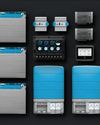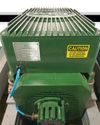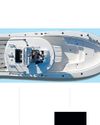
Today, new boats are required to meet American Boat and Yacht Council Standard H-41 to provide (and I am paraphrasing here) a means of unassisted reboarding that is accessible to and deployable by a person in the water.
For safety, this makes a lot of sense, particularly if a boater falls overboard from a vessel with tall gunwales that make it impossible to clamber back over the side. Instead, he or she can deploy a boarding ladder or other reboarding system to climb back in the boat more easily.
However, a fair number of boats on the water today were built before the establishment of ABYC Standard H-41 in 2014; thus, some older vessels-particularly outboard boats with cutout transoms-might not meet this requirement.
To be clear, this is not a legal requirement on older boats, but it is a good idea. Fortunately, there ways to add compliant reboarding systems, and one of the most popular for outboard-powered boats is the Garelick model 19536 transom platform with a telescoping, two-step stainless-steel boarding ladder.
The ladder retracts to stow under the 18-inch-wide-by15-inch-long polyethylene platform and is secured with a snap on a web strap. To deploy, the swimmer unsnaps the strap, pulls out and folds down the ladder, then uses the handhold and ladder to step up and into the boat. Here's how to install this boarding system on an outboard-powered boat with an older-style cutout transom.
This story is from the May 2023 edition of Boating.
Start your 7-day Magzter GOLD free trial to access thousands of curated premium stories, and 9,000+ magazines and newspapers.
Already a subscriber ? Sign In
This story is from the May 2023 edition of Boating.
Start your 7-day Magzter GOLD free trial to access thousands of curated premium stories, and 9,000+ magazines and newspapers.
Already a subscriber? Sign In

AFFORDABLE SATCOM
Communications devices using satellite technology are more abundant today than any time in the past. What's more, many are portable, ultra-compact, affordable relatively and designed for boating, dispelling any perceptions that you need a big, expensive dome antenna aloft to access satellite communications.

IN THE BEGINNING
REPOWERING FOUNTAIN HULL NO.1

NAVICO GROUP FATHOM 2.0
Engine charging at 48 volts could be a game-changer.

PROPS FOR INNOVATION
Sharrow MX3 propellers live up to most of the company's performance-improvement claims.

MERCURY RACING 500R
Supercharged power for a variety of boats.

FLIPPING THE SWITCH
Much reporting focuses on reasons why one might choose electric marine power. The issues of range, speed, noise levels, winterizing and ethanol challenges, lake restrictions, environmental concerns and more all must be resolved on an individual basis. Little gets said about how a boater choosing to repower with electric actually gets that accomplished. Is it DIY? And if not, how does it get done?

TOW-VEHICLE TECH
If it's been a while since you bought new tow vehicle, you might be surprised by the many built-in advancements in trailering technology. New tow tech ranges from integrated weight scales and adaptive suspensions to systems that automatically back up your truck to hitch up your trailer. Here are a few examples to look for. -Jim Hendricks

MONUMENTAL TIPS FOR BACKING A TRAILER
Three Boating greats offer advice for a perennial reader query.

STICKING POINTS - Anchoring alternatives, and why you will always need a traditional anchor.
My brother-in-law likes to fish offshore reefs, and the process once entailed navigating to a mark, dropping a float, and idling upwind or up-current to drop the anchor in hopes the set would drop us back to the float.

FOR WANT OF A CLAMP
When 100 miles from shore, home and help, this boater’s preparedness prevented potential catastrophe.
